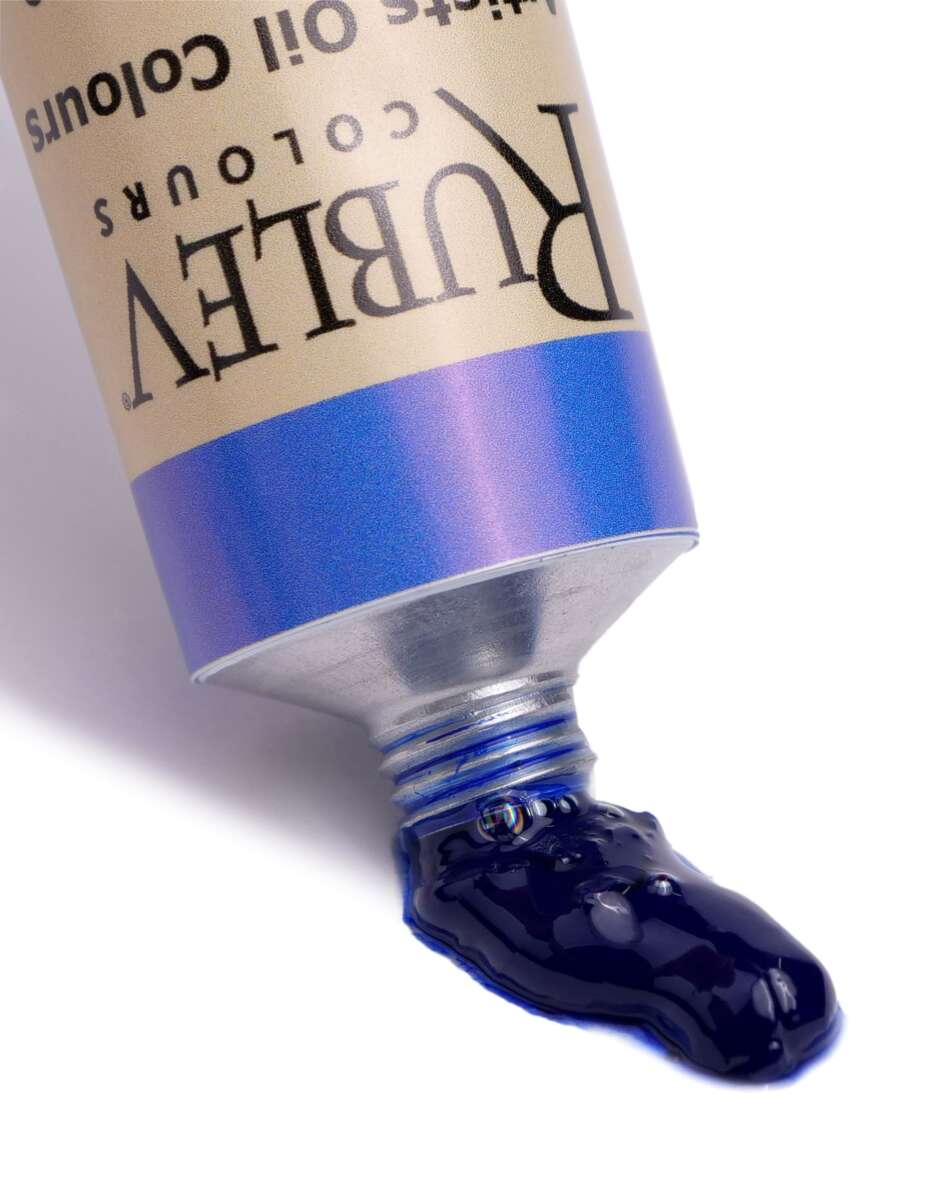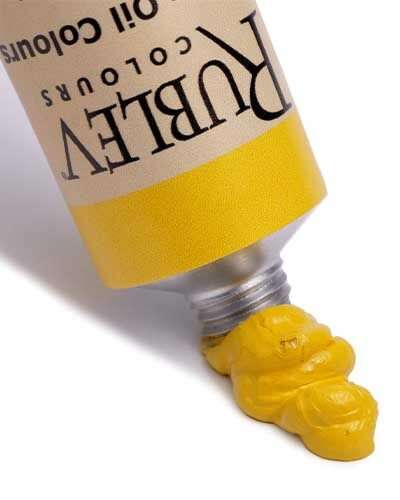Ultramarine Blue (Red Shade) Oil Paint
Rublev Colours Ultramarine Blue (Red Shade) is an intense, deep reddish-shade blue from the synthetic ultramarine pigment and ground in walnut oil. It is a transparent, fine-grained color with high tinting strength. Learn more.
Ultramarine Blue (Red Shade) This ultramarine blue is ground in walnut oil without additives to change the effect of the pigment and oil mixture. As a result, the paint is more buttery than the Ultramarine Blue Green Shade due to the wetting properties of the walnut oil. This produces slightly long brushmarks due to the hydrophilic nature of ultramarine. Although ultramarine oil paint is not unique, this is a novel variation of this popular color.
Ultramarine pigments are sodium aluminum silicates with slight sulfur-containing anions (e.g., S3 and S2) bound as chromospheres in the interstices of the crystal lattice to equalize the charge. Depending on the composition, blue, red, green, or violet pigments can be obtained, the hue being altered by varying the amount of silica. Ultramarine pigments have a high heat resistance, but their universal use in paint is limited because of their poor hiding power and limited weather resistance. Special types of ultramarine pigments are coated with silica to reduce ultramarine's susceptibility to acid and improve its weather resistance.
Composition and Permanence
| Ultramarine Blue (Green Shade) | |
| Color: | Blue |
| Binder: | Walnut oil |
| Additive(s): | None |
| Pigment Information | |
| Pigment: | Ultramarine Blue (Red Shade) |
| Pigment Classification: | Synthetic inorganic |
| Colour Index: | Pigment Blue 29 (77007) |
| Chemical Name: | Sodium Calcium Aluminum Silicate Sulfate |
| Chemical Formula: | (Na, Ca)8Al6Si6O24(S, SO4) |
| CAS No. | 57455-37-5 |
| Properties | |
| Code: | 105 |
| Series: | 2 |
| Opacity: | Transparent |
| Tinting Strength: | High |
| Drying Rate: | Medium |
| Lightfastness: | I |
| Permanence: | A - 3 |
| Safety Information: | Based on the toxicological review, there are no acute or known chronic health hazards with the anticipated use of this product. Always protect yourself against potentially unknown chronic hazards of this and other chemical products by avoiding ingestion, excessive skin contact, and inhaling spraying mists, sanding dust, and concentrated vapors. Contact us for further information or consult the MSDS for more information. |
For a detailed explanation of the terms in the table above, please visit Composition and Permanence.
Notes
Some separation of pigment and oil may occur in Rublev Colours Artist Oils and is a natural process when no wax or stabilizers are added to paint to prevent this from occurring.
All images of color swatches on this website are only approximations of the actual color of the oil paint. We have carefully matched the color in these pictures on calibrated color monitors to the actual color. However, because of the wide variance in color monitors, the results you get may vary.
Color Swatch Note: The color swatch was created with a thick application (left side) of color and a tint (right side) made with equal parts of color and titanium white and applied on acrylic primed cotton canvas.
Drawdown Note: The image of the "drawdown" contains a pre-mixed paint film of 6 mils (0.006 inches) thickness applied to a standard test card to examine color consistency, opacity, and other qualities. The drawdowns show the color's full strength (mass tone) on the left and mixed in a 1:2 ratio with titanium white on the right. The bottom area of the drawdowns is scraped to show undertones.
| Color Names | |
| Common Names: | English: ultramarine (synthetic) French: outremer German: Ultramarin Italian: oltremare Spanish: ultramarino |
| Synonyms: | azuro oltramarino, azurum transmarinum, azurum ultramarinum, bleu d'azur |
| SKU | 820-105 |
|---|---|
| Brand | Rublev Colours |
| Vendor | Rublev Colours |
| Processing Time | Orders ship on Tuesdays and Thursdays. |
| Color | Blue |
| Pigment Type | Inorganic, Synthetic |
Health & Safety: There are no acute or known chronic health hazards with the anticipated use of this product (most chemicals are not thoroughly tested for chronic toxicity). Protect yourself against potentially unknown chronic hazards of this and other chemical products by avoiding ingestion, excessive skin contact, and inhaling spraying mists, sanding dust, and concentrated vapors from heating. Contact us for further information or consult the SDS for more information. Conforms to ASTM D-4236.









